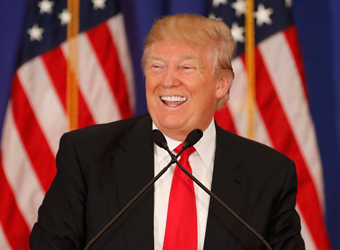Another week, and yet another Asian business leader finds himself in bear-like embrace of the US President-elect Donald Trump.
This time it is China’s Jack Ma – the founder of Alibaba.
On the face of it they’re an unlikely pairing.
One’s been raised in the lap of luxury, the other had humble beginnings. One has taken advantage of the free market capitalism of the West, the other grew up in the Chinese Communist system.
But there are a few things they have in common.
It is possibly Donald Trump’s favourite word: Huge.
And whatever you might think of him, the President-elect certainly has had grand plans.
Taking over his father’s real estate business and turning it an empire. Expanding it into an entertainment business. Running for, and winning, the highest office in the land. There’s no lack of ambition.
He’s now thought to be worth almost $4bn (although consistently claims he’s worth more than double that).
When it comes to wealth, China’s Jack Ma isn’t far behind. He is China’s third richest man and Forbes names him amongst the most powerful people on the planet.
But he started his professional life teaching English to students in a university in a small Chinese town, reportedly making about US$12 a month.
To get better at English, he would court foreign tourists, charming them into having conversations at local hotels.
He started the e-commerce giant Alibaba in his flat, and hasn’t looked back.
Mr Ma also has a grand vision which has driven the company from the start: to create ten million profitable businesses and 100 million jobs in the next 20 years.
Both men are known risk-takers, or as some would say, gamblers.
And perhaps Mr Trump’s biggest gamble was running for president.
He was initially seen as the weakest contender during the campaign for the Republican nomination. But a decision to take a risk and be outrageous helped him, in part at least, to get his name on the ballot paper and ultimately to win the presidency.
Jack Ma is similarly unafraid to take risks.
One of his early internet ventures, China Pages, ended badly when he ended up having to form a joint venture with China Telecom and lost control of the company.
He also burned through a lot of cash in his early days, and at one point had to lay off all of his international staff.
But Mr Ma, who was once rejected from a managerial role at a Kentucky Fried Chicken in Hangzhou, says he wouldn’t be where he is today without having to learn to deal with failure.
Mr Trump is known as one of America’s most colourful and famous billionaires.
He rose to fame as the boss in the hit television show “The Apprentice” and his trademark “You’re Fired” became a catchphrase.
But eccentric, and many would say outrageous, comments on the campaign trail have also led to him being called crazy by his critics, for all the wrong reasons.
Remember when he said he would impose a total “shutdown” of Muslims entering the United States? Or how about the the pledge to build a wall on the border with Mexico, and get the US’s neighbour to pay for it? The list goes on.
Mr Ma is often called “Crazy Jack” (though that craziness isn’t seen as offensive.).
His trademark speeches captivate and inspire employees. He is a showman who regularly entertains Alibaba staff with performances that would make Justin Timberlake proud. He’s a familiar smiling face on the televised galas launching Alibaba’s Singles Day sales, and is also known to preside over mass marriages at the firm.
Almost every time a billionaire goes through the doors of Trump Towers, the President-elect comes out with a pledge to create jobs in the US. It is starting to be seen as a fast-pass route to getting business done – as I wrote about when Japan’s Masayoshi Son met with Mr Trump late last year.
His meeting with Jack Ma was no different.
And while the practice of business leaders visiting publicly-elected officials might have many scratching their heads in Western nations, the relationship between business and politics is much closer in many parts of Asia – including China.
So this is a way of doing business that Mr Ma will know and understand well.
China-US relations may well deteriorate after January 20, when Mr Trump has promised to call China out as a currency manipulator, Mr Ma is making sure that his personal relationship with the new president isn’t affected – which can only be good for his business.
Source: BBC


